Unit 2 Topic 1 I have a small nose Section A &B 课件2022-2023学年仁爱版七年级英语上册(共34张PPT)
文档属性
| 名称 | Unit 2 Topic 1 I have a small nose Section A &B 课件2022-2023学年仁爱版七年级英语上册(共34张PPT) |
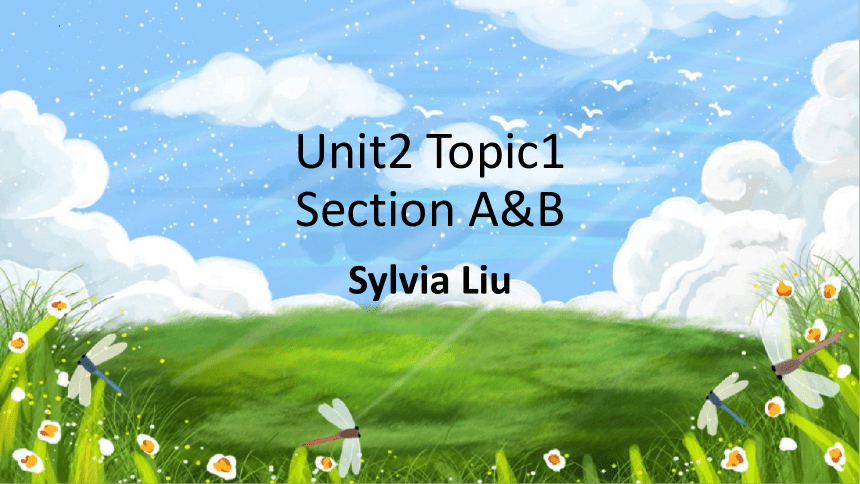
|
|
| 格式 | pptx | ||
| 文件大小 | 4.3MB | ||
| 资源类型 | 教案 | ||
| 版本资源 | 仁爱科普版 | ||
| 科目 | 英语 | ||
| 更新时间 | 2022-10-24 00:00:00 | ||
图片预览

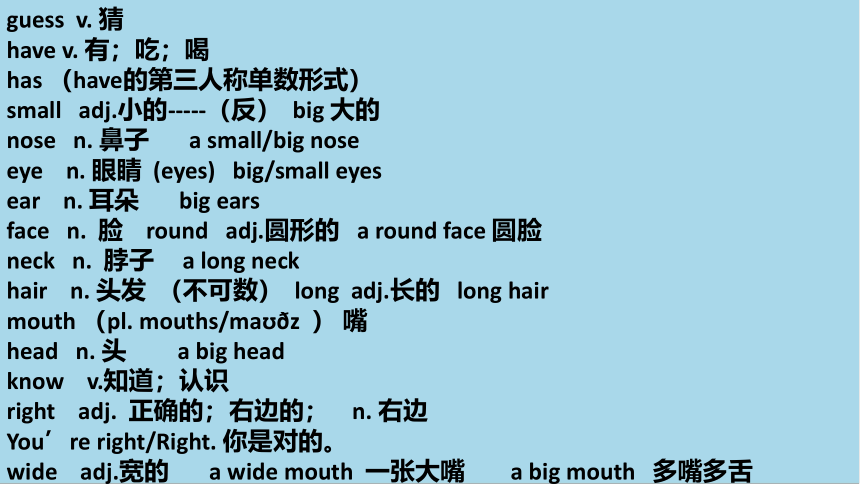
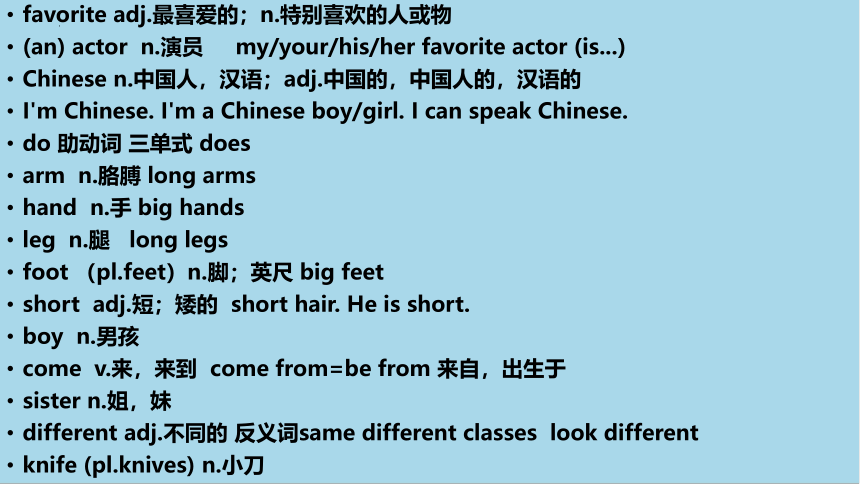
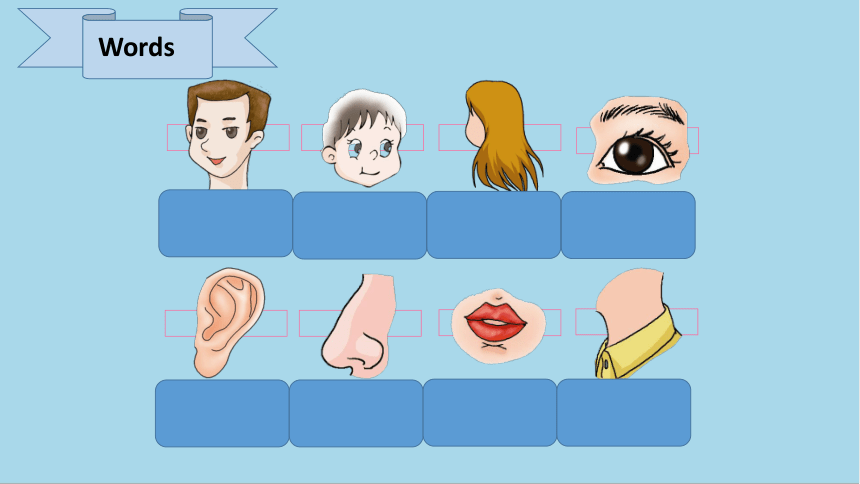

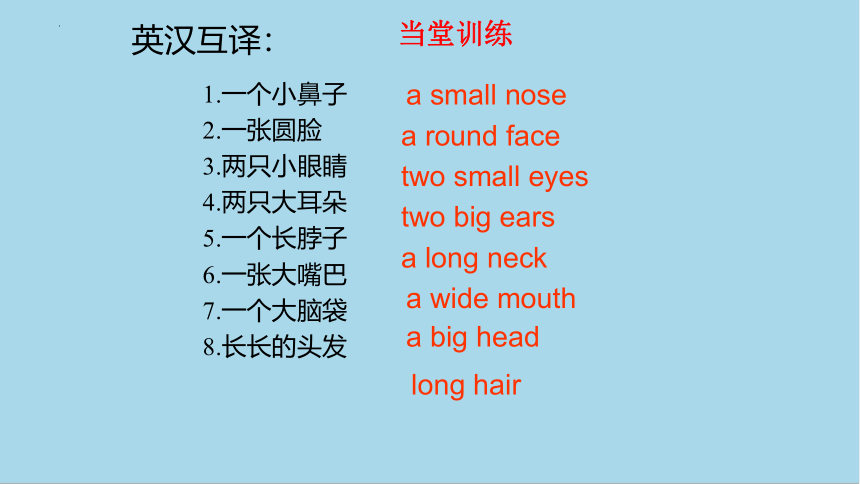
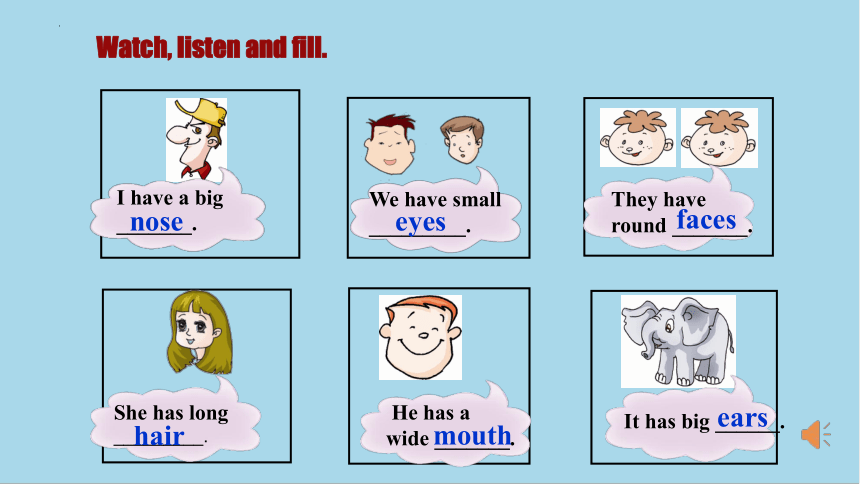
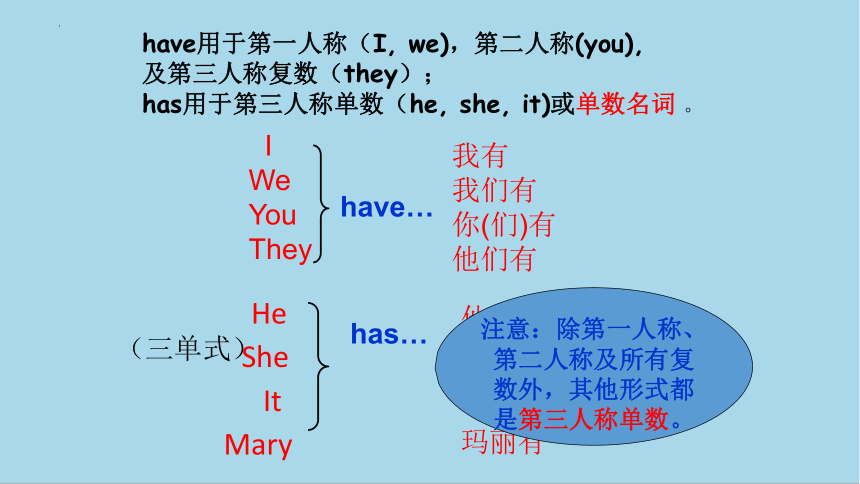
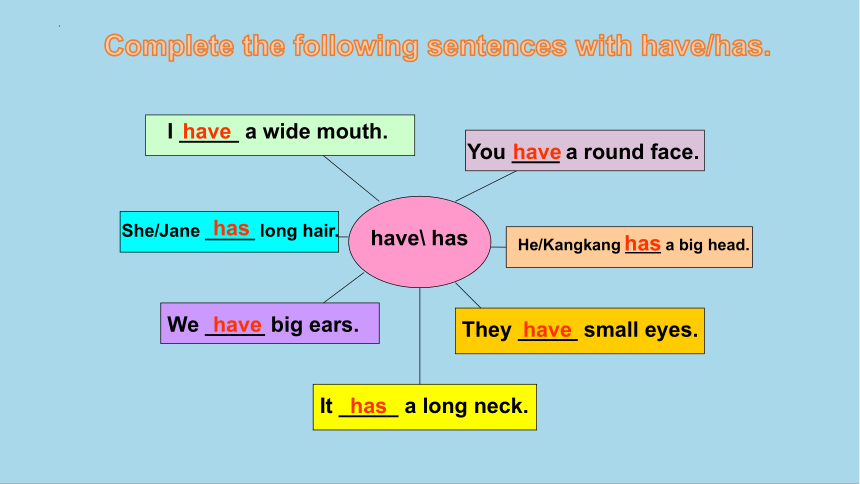
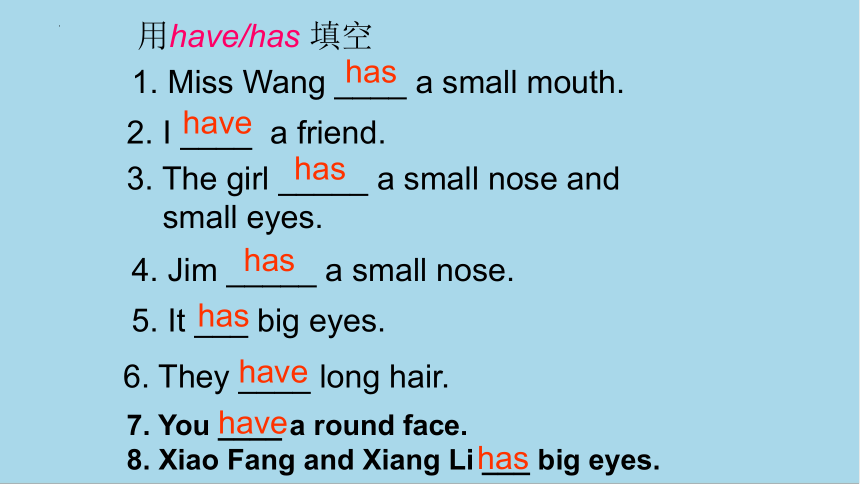
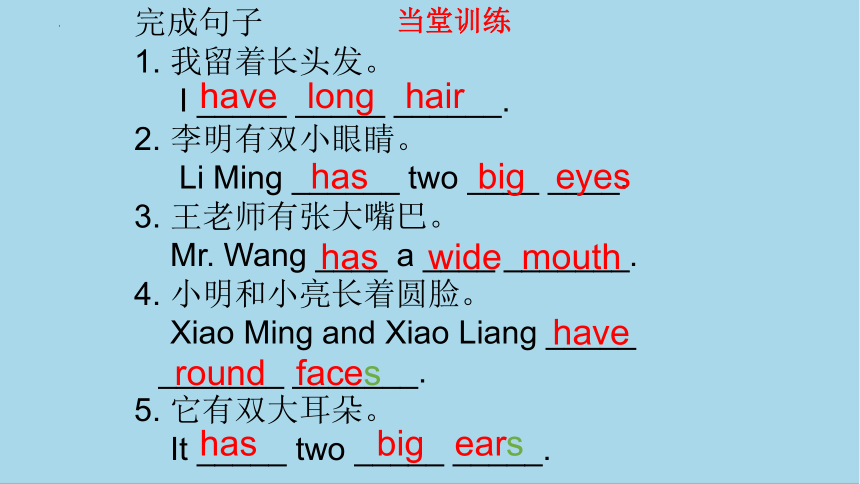
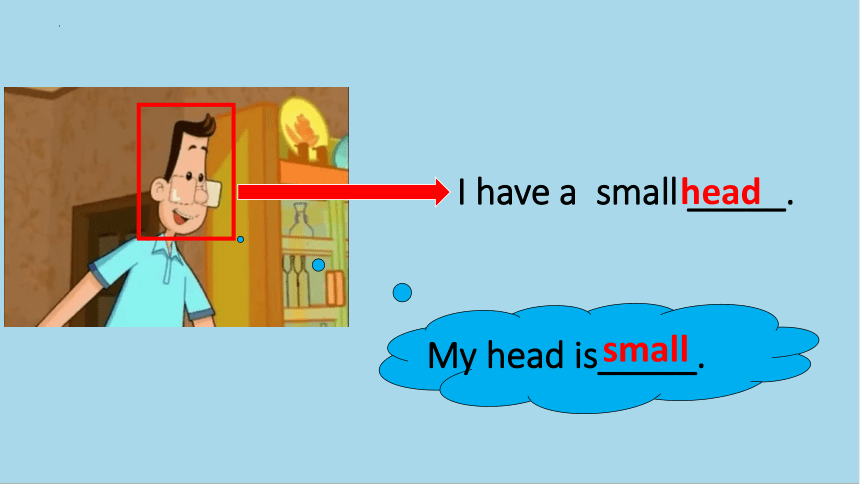
文档简介
(共34张PPT)
Unit2 Topic1
Section A&B
Sylvia Liu
guess v. 猜
have v. 有;吃;喝
has (have的第三人称单数形式)
small adj.小的-----(反) big 大的
nose n. 鼻子 a small/big nose
eye n. 眼睛 (eyes) big/small eyes
ear n. 耳朵 big ears
face n. 脸 round adj.圆形的 a round face 圆脸
neck n. 脖子 a long neck
hair n. 头发 (不可数) long adj.长的 long hair
mouth (pl. mouths/ma z ) 嘴
head n. 头 a big head
know v.知道;认识
right adj. 正确的;右边的; n. 右边
You’re right/Right. 你是对的。
wide adj.宽的 a wide mouth 一张大嘴 a big mouth 多嘴多舌
favorite adj.最喜爱的;n.特别喜欢的人或物
(an) actor n.演员 my/your/his/her favorite actor (is...)
Chinese n.中国人,汉语;adj.中国的,中国人的,汉语的
I'm Chinese. I'm a Chinese boy/girl. I can speak Chinese.
do 助动词 三单式 does
arm n.胳膊 long arms
hand n.手 big hands
leg n.腿 long legs
foot (pl.feet)n.脚;英尺 big feet
short adj.短;矮的 short hair. He is short.
boy n.男孩
come v.来,来到 come from=be from 来自,出生于
sister n.姐,妹
different adj.不同的 反义词same different classes look different
knife (pl.knives) n.小刀
head
face
hair
eye
ear
nose
mouth
neck
Words
A
( )
B
( )
C
( )
D
( )
H
( )
arm
hand
leg
foot
F
( )
G
( )
E
( )
hair
ear
eye
nose
neck
mouth
face
head
Look at the boy and write down the name of each part.P30
英汉互译:
1.一个小鼻子
2.一张圆脸
3.两只小眼睛
4.两只大耳朵
5.一个长脖子
6.一张大嘴巴
7.一个大脑袋
8.长长的头发
a small nose
a round face
two small eyes
two big ears
a long neck
a wide mouth
a big head
long hair
当堂训练
Watch, listen and fill.
I have a big _______.
We have small
_________.
They have round _______.
She has long _________.
He has a wide _______.
It has big ______.
nose
eyes
faces
hair
mouth
ears
He
She
It
Mary
have…
I
We
You
They
has…
我有
我们有
你(们)有
他们有
他有
她有
它有
玛丽有
(三单式)
have用于第一人称(I, we),第二人称(you),
及第三人称复数(they);
has用于第三人称单数(he, she, it)或单数名词 。
注意:除第一人称、第二人称及所有复数外,其他形式都是第三人称单数。
Complete the following sentences with have/has.
have\ has
You ____ a round face.
I _____ a wide mouth.
He/Kangkang ____ a big head.
She/Jane _____ long hair.
We _____ big ears.
They _____ small eyes.
It _____ a long neck.
have
have
has
has
have
have
has
2. I ____ a friend.
6. They ____ long hair.
4. Jim _____ a small nose.
5. It ___ big eyes.
3. The girl _____ a small nose and
small eyes.
1. Miss Wang ____ a small mouth.
has
has
has
has
have
have
7. You ____ a round face.
8. Xiao Fang and Xiang Li ___ big eyes.
have
用have/has 填空
has
完成句子
1. 我留着长头发。
I _____ _____ ______.
2. 李明有双小眼睛。
Li Ming ______ two ____ ____.
3. 王老师有张大嘴巴。
Mr. Wang ____ a ____ _______.
4. 小明和小亮长着圆脸。
Xiao Ming and Xiao Liang _____ _______ _______.
5. 它有双大耳朵。
It _____ two _____ _____.
have long hair
has big eyes
has wide mouth
have
round faces
has big ears
当堂训练
I have a small _____.
head
My head is_____.
small
She has big eyes.
Her eyes are big.
You have a wide ______.
mouth
Your mouth is wide.
Rewrite the sentences with have/has.
Then make more sentences.(P30)
My face is round.
Your face is long.
His hair is short.
Her hair is long.
His arms are long.
Her arms are short.
His feet are big.
Her feet are small.
…
I have a round face.
You have a long face.
He has short hair.
She has long hair.
He has big feet.
She has small feet.
…
He has long arms.
She has short arms.
完成句子
1. 我留着长头发。
I _____ _____ ______.
=____ hair ____ long.
2. 他有一双大脚。
He______ two ____ ____.
=____ two feet _____ big.
3. 她的胳膊很短。
___ arms ___ short.= She ___ short _____.
4. 王老师有张大嘴巴。
Mr. Wang ____ a ____ _______.
=____ mouth ___ wide.
have long hair
My is
has big feet
His are
Her are
has arms
has wide mouth
His is
当堂训练
改为否定句
1.I have a new schoolbag.
2.We have many good friends here.
3.They have long hair.
4.Sally and Jane have small ears.
I don’t have a new schoolbag.
We don’t have many good friends here.
They don’t have long hair.
Sally and Jane don’t have small ears.
7.She has big eyes.
6. Kang kang has a round face.
8.My good friend has a big mouth.
It doesn’t have a long neck.
Kang kang doesn’t have a round face.
She doesn’t have big eyes.
My good friend doesn’t have a big mouth.
does not =doesn’t
5.It has a long neck.
1. They have long hair.
2. I have a new book.
3. Sally and Jane have small ears.
they long hair
you a new book
Sally and Jane small ears
第一人称、第二人称及复数形式作主语用 , 变一般疑问句借助动词 , 基本句式为:
Do+主语+have+其他?
肯定回答:Yes, 主语+do.
否定回答:No, 主语+don’t. don’t=do not
Yes, I do.
No, I don’t.
Yes, they do.
No, they don’t.
Yes, they do.
No, they don’t.
Do
have
Do
have
Do
have
have
do
I _____ a wide mouth.(变成一般疑问句)
They _____ small eyes.
We _____ big ears.
Do you have a wide mouth
Yes, I do.
No, I don’t.
have
have
Do they have small eyes
Yes, they do.
No, they don’t.
have
Do you have big eyes
Yes, we do.
No, we don’t.
1. She has big eyes.
2. Kangkang has a round face.
3. It has a long neck.
she big eyes
Kangkang a round face
it a long neck
主语是第三人称单数用 , 变一般疑问句要借助动
词 , 基本句式为:Does + 主语+ have+其它?
肯定回答:Yes, 主语+does.
否定回答:NO, 主语+ doesn’t. doesn’t= does not
Yes, she does.
No, she doesn’t
Yes, he does.
No, he doesn’t.
Yes, it does.
No, it doesn’t.
Does
have
Does
Does
have
have
has
does
4. We have small eyes.(改为一般疑问句并作肯定和否定回答)
—— —— —— —— ——
——, —— ——.
——, —— ——.
5. Jane and Kangkang have round faces. (改为一般疑问句并作肯定和否定回答)
—— —— —— ————— —— —— ——
——, —— ——.
——, —— ——.
Do you have small eyes
Yes we do
No we don't
Do Jane and Kangkang have round faces
Yes they do
No they don't
6. It has big ears.(改为一般疑问句并作肯定和否定回答)
—— —— —— —— ——
——, —— ——.
——, —— ——.
7. Kangkang has a big head. (改为一般疑问句并作肯定和否定回答)
—— —————— —— —— —— ——
——, —— ——.
——, —— ——.
Does it have big ears
Yes it does
No it doesn't
Does Kangkang have a big head
Yes he does
No he doesn't
改写一般疑问句:
1.I am from Canada. ________________________________
Sally is a teacher. ____________________
3 . Sally is from Cuba.
_____ _____ _____ _____
4 . They are from America.
____ ____ ____ ____
Are you from Canada
Is Sally a teacher
Is Sally from Cuba
Are they from America
1.They have long hair.
2.She has big eyes.
3. Kangkang has a round face.
、
Do they have long hair
Does she have big eyes
Does Kangkang have a round face
1. She is from Canada.
_____ she from ______
2. They are in Grade Seven.
_____ they in Grade Seven
3.I have a small face.(改为一般疑问句及否定句)
____ you _____ a small face
I ____ have a small face.
4.He has big hands.(改为一般疑问句及否定句)
____ he _____ big hands
He _______ _____ big hands.
Is
Canada
Are
Do
have
Does
have
把下列句子改为一般疑问句:
doesn’t have
don’t
1.She ____ big eyes.
2.Kangkang____ a round face.
3.They ____ long hair.
4.It ___ a long neck.
5.Sally and Jane ____ small ears.
6.My good friend ____ a wide mouth.
7.I ____ a new schoolbag.
8.We ____ many good friends here.
9. Mr. Brown ___ a big nose.
用have或has完成句子;变成一般疑问句并作答;变否定句
( )1. kangkang has a big eyes.
( )2. Michael has a small nose.
( )3. Kangkang has a big nose.
( )4. A is Michael.
SectionA:Listen 1a and write T (True) or F (False).
T
F
F
F
Who am I Can you guess
Yes. Are you Michael
No, I’m not. I have a small nose,
but he has a big one.
Do you have big eyes
Yes, I do.
Oh, I know. You are Kangkang.
Yes, you’re right.
Listen, read and role play.
=I see.
I don't know./
Do you know
Listen and answer the question
Who is Michael’s favorite actor
1b Listen again and fill.
Jackie Chan is Michael’s __________ actor. He is from _____.He has a ____ nose and his hair is not ____. He has a _____ mouth. His Chinese name is __________.
favorite
big
long
wide
Cheng Long
China
K: Michael, who is your favorite actor
M: Guess . He is Chinese and he has a big nose.
K: Does he have long hair
M: No, he doesn’t.
K: Does he have a wide mouth
M: Yes, he does.
K: I see. It’s Jackie Chan.
“你的”,形容词性物主代词
“最喜欢的(人或物)”
“中国人, 中国的”,
“我明白了”=I know.
It 这里用来指人,用来明确身份。
Listen and check ( √ ) who is Mr. Wang.
√
Thank you!
Unit2 Topic1
Section A&B
Sylvia Liu
guess v. 猜
have v. 有;吃;喝
has (have的第三人称单数形式)
small adj.小的-----(反) big 大的
nose n. 鼻子 a small/big nose
eye n. 眼睛 (eyes) big/small eyes
ear n. 耳朵 big ears
face n. 脸 round adj.圆形的 a round face 圆脸
neck n. 脖子 a long neck
hair n. 头发 (不可数) long adj.长的 long hair
mouth (pl. mouths/ma z ) 嘴
head n. 头 a big head
know v.知道;认识
right adj. 正确的;右边的; n. 右边
You’re right/Right. 你是对的。
wide adj.宽的 a wide mouth 一张大嘴 a big mouth 多嘴多舌
favorite adj.最喜爱的;n.特别喜欢的人或物
(an) actor n.演员 my/your/his/her favorite actor (is...)
Chinese n.中国人,汉语;adj.中国的,中国人的,汉语的
I'm Chinese. I'm a Chinese boy/girl. I can speak Chinese.
do 助动词 三单式 does
arm n.胳膊 long arms
hand n.手 big hands
leg n.腿 long legs
foot (pl.feet)n.脚;英尺 big feet
short adj.短;矮的 short hair. He is short.
boy n.男孩
come v.来,来到 come from=be from 来自,出生于
sister n.姐,妹
different adj.不同的 反义词same different classes look different
knife (pl.knives) n.小刀
head
face
hair
eye
ear
nose
mouth
neck
Words
A
( )
B
( )
C
( )
D
( )
H
( )
arm
hand
leg
foot
F
( )
G
( )
E
( )
hair
ear
eye
nose
neck
mouth
face
head
Look at the boy and write down the name of each part.P30
英汉互译:
1.一个小鼻子
2.一张圆脸
3.两只小眼睛
4.两只大耳朵
5.一个长脖子
6.一张大嘴巴
7.一个大脑袋
8.长长的头发
a small nose
a round face
two small eyes
two big ears
a long neck
a wide mouth
a big head
long hair
当堂训练
Watch, listen and fill.
I have a big _______.
We have small
_________.
They have round _______.
She has long _________.
He has a wide _______.
It has big ______.
nose
eyes
faces
hair
mouth
ears
He
She
It
Mary
have…
I
We
You
They
has…
我有
我们有
你(们)有
他们有
他有
她有
它有
玛丽有
(三单式)
have用于第一人称(I, we),第二人称(you),
及第三人称复数(they);
has用于第三人称单数(he, she, it)或单数名词 。
注意:除第一人称、第二人称及所有复数外,其他形式都是第三人称单数。
Complete the following sentences with have/has.
have\ has
You ____ a round face.
I _____ a wide mouth.
He/Kangkang ____ a big head.
She/Jane _____ long hair.
We _____ big ears.
They _____ small eyes.
It _____ a long neck.
have
have
has
has
have
have
has
2. I ____ a friend.
6. They ____ long hair.
4. Jim _____ a small nose.
5. It ___ big eyes.
3. The girl _____ a small nose and
small eyes.
1. Miss Wang ____ a small mouth.
has
has
has
has
have
have
7. You ____ a round face.
8. Xiao Fang and Xiang Li ___ big eyes.
have
用have/has 填空
has
完成句子
1. 我留着长头发。
I _____ _____ ______.
2. 李明有双小眼睛。
Li Ming ______ two ____ ____.
3. 王老师有张大嘴巴。
Mr. Wang ____ a ____ _______.
4. 小明和小亮长着圆脸。
Xiao Ming and Xiao Liang _____ _______ _______.
5. 它有双大耳朵。
It _____ two _____ _____.
have long hair
has big eyes
has wide mouth
have
round faces
has big ears
当堂训练
I have a small _____.
head
My head is_____.
small
She has big eyes.
Her eyes are big.
You have a wide ______.
mouth
Your mouth is wide.
Rewrite the sentences with have/has.
Then make more sentences.(P30)
My face is round.
Your face is long.
His hair is short.
Her hair is long.
His arms are long.
Her arms are short.
His feet are big.
Her feet are small.
…
I have a round face.
You have a long face.
He has short hair.
She has long hair.
He has big feet.
She has small feet.
…
He has long arms.
She has short arms.
完成句子
1. 我留着长头发。
I _____ _____ ______.
=____ hair ____ long.
2. 他有一双大脚。
He______ two ____ ____.
=____ two feet _____ big.
3. 她的胳膊很短。
___ arms ___ short.= She ___ short _____.
4. 王老师有张大嘴巴。
Mr. Wang ____ a ____ _______.
=____ mouth ___ wide.
have long hair
My is
has big feet
His are
Her are
has arms
has wide mouth
His is
当堂训练
改为否定句
1.I have a new schoolbag.
2.We have many good friends here.
3.They have long hair.
4.Sally and Jane have small ears.
I don’t have a new schoolbag.
We don’t have many good friends here.
They don’t have long hair.
Sally and Jane don’t have small ears.
7.She has big eyes.
6. Kang kang has a round face.
8.My good friend has a big mouth.
It doesn’t have a long neck.
Kang kang doesn’t have a round face.
She doesn’t have big eyes.
My good friend doesn’t have a big mouth.
does not =doesn’t
5.It has a long neck.
1. They have long hair.
2. I have a new book.
3. Sally and Jane have small ears.
they long hair
you a new book
Sally and Jane small ears
第一人称、第二人称及复数形式作主语用 , 变一般疑问句借助动词 , 基本句式为:
Do+主语+have+其他?
肯定回答:Yes, 主语+do.
否定回答:No, 主语+don’t. don’t=do not
Yes, I do.
No, I don’t.
Yes, they do.
No, they don’t.
Yes, they do.
No, they don’t.
Do
have
Do
have
Do
have
have
do
I _____ a wide mouth.(变成一般疑问句)
They _____ small eyes.
We _____ big ears.
Do you have a wide mouth
Yes, I do.
No, I don’t.
have
have
Do they have small eyes
Yes, they do.
No, they don’t.
have
Do you have big eyes
Yes, we do.
No, we don’t.
1. She has big eyes.
2. Kangkang has a round face.
3. It has a long neck.
she big eyes
Kangkang a round face
it a long neck
主语是第三人称单数用 , 变一般疑问句要借助动
词 , 基本句式为:Does + 主语+ have+其它?
肯定回答:Yes, 主语+does.
否定回答:NO, 主语+ doesn’t. doesn’t= does not
Yes, she does.
No, she doesn’t
Yes, he does.
No, he doesn’t.
Yes, it does.
No, it doesn’t.
Does
have
Does
Does
have
have
has
does
4. We have small eyes.(改为一般疑问句并作肯定和否定回答)
—— —— —— —— ——
——, —— ——.
——, —— ——.
5. Jane and Kangkang have round faces. (改为一般疑问句并作肯定和否定回答)
—— —— —— ————— —— —— ——
——, —— ——.
——, —— ——.
Do you have small eyes
Yes we do
No we don't
Do Jane and Kangkang have round faces
Yes they do
No they don't
6. It has big ears.(改为一般疑问句并作肯定和否定回答)
—— —— —— —— ——
——, —— ——.
——, —— ——.
7. Kangkang has a big head. (改为一般疑问句并作肯定和否定回答)
—— —————— —— —— —— ——
——, —— ——.
——, —— ——.
Does it have big ears
Yes it does
No it doesn't
Does Kangkang have a big head
Yes he does
No he doesn't
改写一般疑问句:
1.I am from Canada. ________________________________
Sally is a teacher. ____________________
3 . Sally is from Cuba.
_____ _____ _____ _____
4 . They are from America.
____ ____ ____ ____
Are you from Canada
Is Sally a teacher
Is Sally from Cuba
Are they from America
1.They have long hair.
2.She has big eyes.
3. Kangkang has a round face.
、
Do they have long hair
Does she have big eyes
Does Kangkang have a round face
1. She is from Canada.
_____ she from ______
2. They are in Grade Seven.
_____ they in Grade Seven
3.I have a small face.(改为一般疑问句及否定句)
____ you _____ a small face
I ____ have a small face.
4.He has big hands.(改为一般疑问句及否定句)
____ he _____ big hands
He _______ _____ big hands.
Is
Canada
Are
Do
have
Does
have
把下列句子改为一般疑问句:
doesn’t have
don’t
1.She ____ big eyes.
2.Kangkang____ a round face.
3.They ____ long hair.
4.It ___ a long neck.
5.Sally and Jane ____ small ears.
6.My good friend ____ a wide mouth.
7.I ____ a new schoolbag.
8.We ____ many good friends here.
9. Mr. Brown ___ a big nose.
用have或has完成句子;变成一般疑问句并作答;变否定句
( )1. kangkang has a big eyes.
( )2. Michael has a small nose.
( )3. Kangkang has a big nose.
( )4. A is Michael.
SectionA:Listen 1a and write T (True) or F (False).
T
F
F
F
Who am I Can you guess
Yes. Are you Michael
No, I’m not. I have a small nose,
but he has a big one.
Do you have big eyes
Yes, I do.
Oh, I know. You are Kangkang.
Yes, you’re right.
Listen, read and role play.
=I see.
I don't know./
Do you know
Listen and answer the question
Who is Michael’s favorite actor
1b Listen again and fill.
Jackie Chan is Michael’s __________ actor. He is from _____.He has a ____ nose and his hair is not ____. He has a _____ mouth. His Chinese name is __________.
favorite
big
long
wide
Cheng Long
China
K: Michael, who is your favorite actor
M: Guess . He is Chinese and he has a big nose.
K: Does he have long hair
M: No, he doesn’t.
K: Does he have a wide mouth
M: Yes, he does.
K: I see. It’s Jackie Chan.
“你的”,形容词性物主代词
“最喜欢的(人或物)”
“中国人, 中国的”,
“我明白了”=I know.
It 这里用来指人,用来明确身份。
Listen and check ( √ ) who is Mr. Wang.
√
Thank you!
同课章节目录
- Unit 1 Making new friends
- Topic 1 Welcome to China!
- Topic 2 Where are you from?
- Topic 3 How old are you?
- Unit 2 Looking different
- Topic 1 I have a small nose
- Topic 2 What does she look like?
- Topic 3 Whose jacket is this?
- Unit 3 Getting togethe
- Topic 1 Does he speak Chinese?
- Topic 2 What do your parents do?
- Topic 3 What would you like to drink?
- Unit 4 Having fun
- Topic 1 What can I do for you?
- Topic 2 Would you like to cook with us?
- Topic 3 What time is it now?
